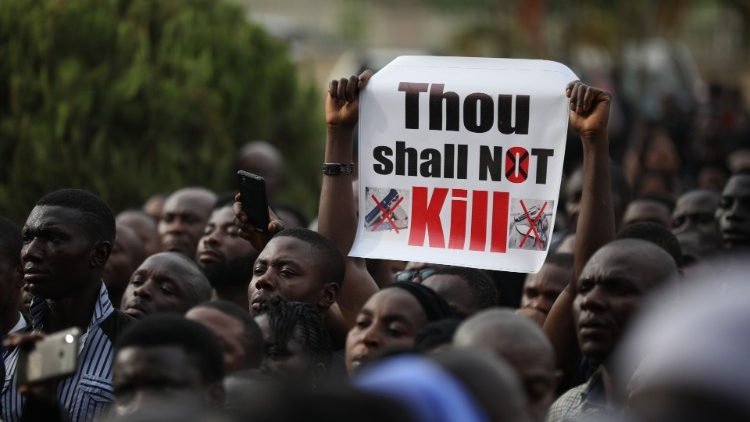The Catholic Bishops’ Conference of Nigeria (CBCN) expresses concern on insecurity in the country and calls on the government to “put a complete stop to the killing of innocent people.”
By Fr. Benedict Mayaki, SJ
The Catholic Bishops of Nigeria (CBCN) have decried the “increasing insecurity” and acts of terrorism in the country in the wake of recent violent attacks, especially in Northern Nigeria.
“We continue to hear of increasing insecurity and unabated acts of terrorism in Northern Nigeria. We are all tired of this situation,” said the Bishops in a statement issued on 8 August.
“Our hearts are bleeding, and we are more troubled when we hear of the massacre presently going on in Southern Kaduna.”
“There should be one response from everyone, and that is; the killings must stop,” read the statement signed by CBCN President, Archbishop Augustine Obiora Akubeze of Benin City on behalf of all the country’s bishops.
Context
Violence in the form of attacks by suspected Fulani militia has increased recently in Northern Nigeria, especially in Kaduna State. Local media reports attribute at least three attacks on Southern Kaduna to the Fulani group in July alone.
About 76 people were also killed in an attack on Sabon Birni Local Government Area of Sokoto State in June. Last month, five humanitarian aid workers were violently murdered by Boko Haram militants after being abducted in Borno State in June.
On Wednesday, at least thirty-three persons, mostly women and children, were killed by unknown gunmen in an attack on five Atyap chiefdom villages in Zangon Kataf Local Government Area of Kaduna State. The State government recently imposed a curfew in the area due to the rising tensions.
“When there is no justice or justice is not seen to be done, there cannot be peace. When there is no peace, there cannot be development,”
Appeal to the government
The bishops called on the Federal Government, as well as the Kaduna State Government to put an end to the killing of innocent people. They also insisted that “the perpetrators of the killings must be brought to justice.”
“The loss of the life of any Nigerian does not help to further the agenda of any religious ideology or the ambition of any politician,” read the statement. “There will never be sustained development built upon the bloodshed of innocent people brutally murdered by religious fundamentalists without any recourse to justice for the victims.”
“When there is no justice or justice is not seen to be done, there cannot be peace. When there is no peace, there cannot be development,” the bishops stressed.
Promises unkept
The bishops recalled that the present government came into power riding on the back of promises to eradicate corruption, guarantee security to life and property, and stimulate rapid growth in the economy.
“The creation of jobs, and an enabling environment that engenders growth of the private sector; a significant increase in the supply of electricity to Nigerians, affordable and quality health care to Nigerians, and the revamping of the education sector were the promises the Government continues to make,” they said.
However, noted the bishops, “many Nigerians, irrespective of political party affiliation, will affirm that these promises have remained a far cry.”
Call for prayers
In the face of these concerns, the Bishops invite all Catholics to join in praying one Our Father, three Hail Marys and one Glory Be to the Father “every day after the Angelus for forty days.”
This joint prayer will start from 22 August through to 30 September 2020 – the eve of Nigeria’s Independence Day anniversary. On 1 October (Nigeria’s Independence Day), the faithful are to pray the five decades of the Sorrowful Mysteries of the Rosary “for God to save Nigeria.”
“We want all the people suffering the incessant attacks in Southern Kaduna to know that all the Catholics in Nigeria are praying for them,” the Bishops said.
Concluding, the Nigerian Bishops enjoined everyone to be instruments of peace and reconciliation, and to be “on the part of justice for all.” They also prayed for eternal rest to all who died in the violence in Northern Nigeria and in other parts of the country.



